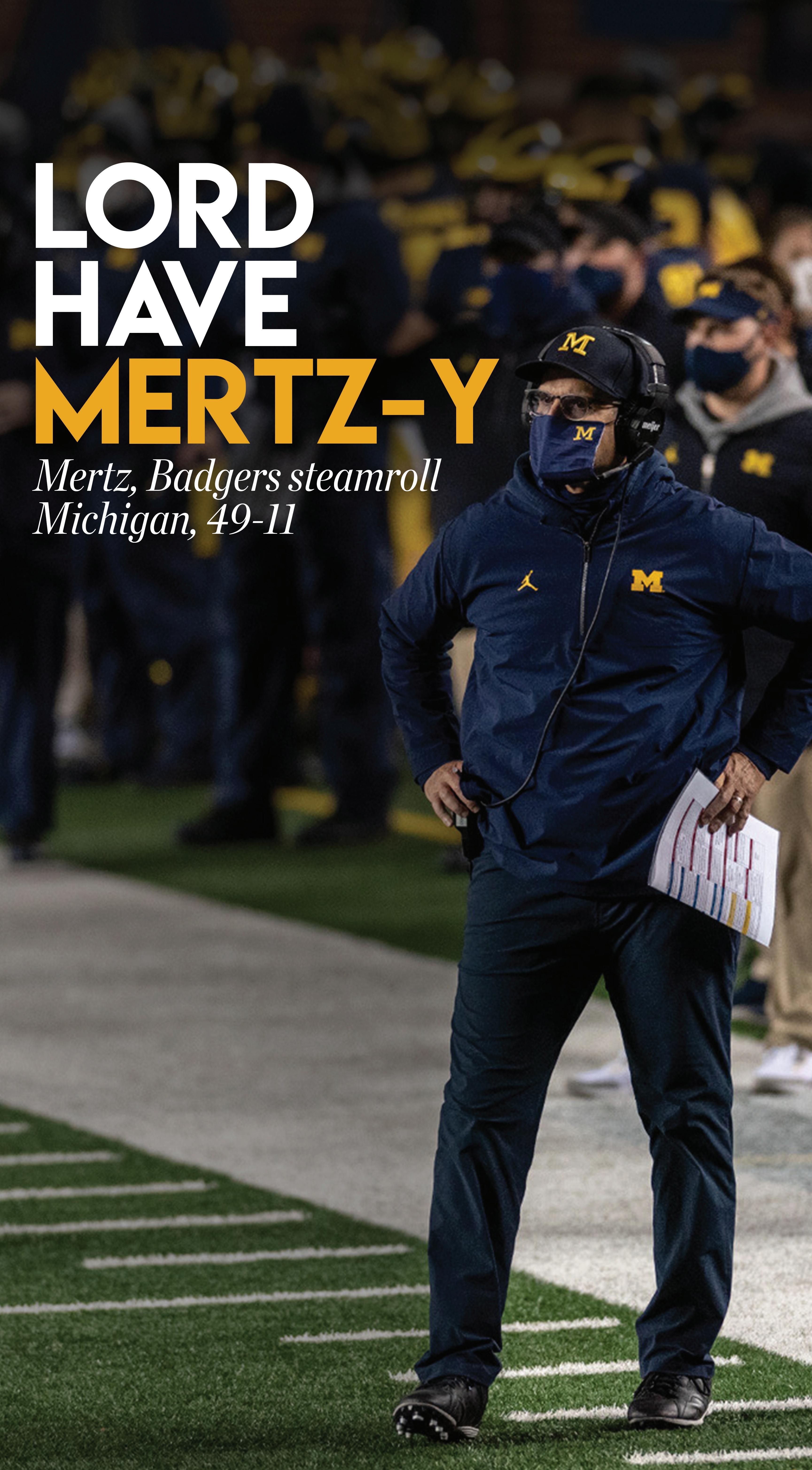Opinion
Wednesday, November 18, 2020 — 8
The Michigan Daily — michigandaily.com
DAVID LISBONNE | COLUMN
Edited and managed by students at the University of Michigan since 1890. Stanford Lipsey Student Publications Building 420 Maynard St. Ann Arbor, MI 48109 tothedaily@michigandaily.com
ELIZABETH LAWRENCE Editor in Chief
BRITTANY BOWMAN AND EMILY CONSIDINE Editorial Page Editors
ERIN WHITE Managing Editor
EDITORIAL BOARD MEMBERS Ray Ajemian Zack Blumberg Brittany Bowman Emily Considine Elizabeth Cook
Brandon Cowit Jess D’Agostino Jenny Gurung Krystal Hur Min Soo Kim Lizzy Peppercorn
Zoe Phillips Mary Rolfes Gabrijela Skoko Joel Weiner Erin White
Unsigned editorials reflect the official position of The Daily’s Editorial Board. All other signed articles and illustrations represent solely the views of their authors.
FROM THE DAILY
O
Skepticism for winter 2021
n Nov. 6, the University of Michigan announced a plan for the winter semester that included major changes to on-campus housing, class formats and testing protocols and accessibility. Most notably, the University will be converting on-campus housing into single-occupancy units, with undergraduates required to provide a reason to stay in one. Additionally, COVID-19 testing will be made mandatory for all students living in on-campus housing or participating in on-campus activities, and an even larger proportion of classes will be moved online than were during the fall semester. Upon releasing the plan, University President Mark Schlissel stated, “The changes we’ve made for winter semester reflect what we’ve learned and what we must do to keep our community safe.” It’s no secret that both the administration and the students made mistakes this semester. We’ve recorded thousands of cases of COVID-19, which resulted in a countywide shutdown of undergraduate activity. Now is the time to prove we can do better. The University needs to expand housing to accommodate students with special cases and make their criteria to stay on campus more widely known and accessible for those not able to move home. The University also needs to release a clear and comprehensive plan to actually implement effective COVID-19 testing, which did not happen this fall. Students need to take this opportunity to make responsible decisions going forward. The looming uncertainty of housing security haunts freshmen, causing them to seek off-campus alternatives instead of re-applying for residence halls where they will also avoid mandatory testing by the University. While the new plan was implemented in hopes of reducing off-campus social gatherings — citing that there is “little evidence” that on-campus activities largely contribute to the spread of the virus — it seems that the new plan is doing just the opposite. Furthermore, the University’s plan could encourage those who have neglected social distancing guidelines to push parties further underground, while those who have honored the University’s policies are left in the dust. And while the University is allowing select students to return to campus housing if their circumstances qualify them for need-based on-campus housing and they applied by Nov. 11, the requirements appear muddy. The qualifications for need-based housing include students who are taking a necessary in-person class, who have financial needs, who have wellness or safety concerns, international students and ResStaff. However, the University neglects to precisely define “wellness or safety concerns,” which could potentially exclude students with mental health concerns if they aren’t prioritized. In addition, the closing of residence halls disproportionately affects marginalized students who don’t have the privilege of signing a lease with five days of notice, as well as students who cannot afford to take a gap year or gap semester due to financial aid that requires them to enroll as a fulltime student. The University is scapegoating freshmen as the culprits of the “unacceptable” levels of COVID-19 cases this fall rather than admitting to their own wrongdoings. As predicted by the graduate student employees in the beginning of this semester, the University’s plan for the fall was insufficient to prevent the spread of COVID-19 and strict changes
are necessary. While students do have agency of their own, by relying on students to socially distance on a campus designed to promote socialization, the University is at fault for the rise in cases we have experienced this semester. Earlier, the Graduate Employees’ Organization strike campaigned for the Division of Public Safety and Security funds to be relocated to the implementation of COVID-19 protections and for mandatory testing. Instead of blaming freshmen, the University should have listened more to the demands of the GEO strike, or at least have credited them in the plan for the winter semester. The University’s announcement for the upcoming semester contains plans for more robust testing, including testing all on-campus residents and attendees of in-person classes or research. However, the breakage of all residence hall leases that has pushed on-campus students to scramble for sublets and winter leases decreases the number of students the University would be responsible for testing. While the increased availability of asymptomatic testing will increase overall testing, students off-campus are unlikely to make the effort to get tested often without enforcement, especially as the weather becomes colder. Many other universities across the nation have managed to increase testing numbers through penalizing students for not getting tested or even offering prizes and rewards for getting tested. The University should consider implementing similar systems to encourage more widespread testing. The University witnessed a spike in third-party testing this semester. Many students have voiced concerns over being forced into the infamous isolation housing and difficulties in getting tested through the University Health Service. The winter 2021 testing plan does guarantee “weekly asymptomatic testing available for all students … who are not otherwise covered by a mandatory program.” For this policy to be effective, however, the University must make it easy for students to sign up for testing, offer different testing locations for accessibility to off-campus students and encourage all students to get tested routinely. The success of the University’s plan to control COVID-19 during the winter 2021 semester cannot rely upon administrative efforts alone. We, as students, must be willing to follow public health guidelines, including the sacrifices that entails. While many students have been staying socially distanced, a large portion of undergraduates have continued to engage in unsafe activities. Fraternity & Sorority Life members continue to host and attend large indoor gatherings and hold in-person
recruitment events. As a result, FSL has experienced COVID-19 outbreaks. Students also continue to gather in large numbers in and around bars and restaurants near campus, including the Brown Jug, which became a COVID-19 hotspot earlier this semester. And as Michigan football began its delayed season, the “Overheard at umich” Facebook page featured several images documenting large and unmasked tailgate events. While the University has failed us with an insufficient plan for fall semester, we have also failed each other. Many students have expressed frustration that administration is shifting blame onto uncooperative undergraduates, but we need to stop giving them this option in the first place. Though administration bears the ultimate responsibility, we should engage on an individual level — the same way many environmental activists view individual climate action. Just as no one person can stop climate change, no one student can control the COVID-19 pandemic. But the combination of individual efforts sends a collective message to the University that we are willing to make sacrifices and concessions for our community, and we expect nothing less from them. Finally, we need to hold one another accountable with student-led initiatives, similar to the “F*ck It Won’t Cut It” campaign spearheaded by Boston University undergraduates. Wolverines should collectively encourage one another to stay COVID-conscious this winter — and should productively call one another out when we don’t. The winter 2021 plan presents significant changes to life at the University next semester. In many ways, this plan has been the one the community demanded for fall — limited on-campus housing, widespread testing and courses held remotely whenever possible. But transitioning to this plan in the middle of the school year will cause disruption for many students. Moreover, the fumbling of the fall semester by administration has created skepticism toward the University’s ability to pull off the revamped winter plan. Ultimately, next semester will be an exercise in trust-building for students, both with administration and with each other. Will the University prioritize students over profits to keep us safe? Will they take full responsibility for their missteps rather than shifting blame onto students? And will students be willing to make personal sacrifices to demonstrate that they take this crisis seriously? The failures of this fall have sown animosity and distrust within our community. The winter plan may be the first step toward improvement — but it could also make things even worse.
I
imagine that for the political aspirant, there’s a great deal to learn from this election regarding campaign strategy, polling accuracy, voting patterns and a myriad of other facets of electoral politics. As ever with an eye for history, I ignored this and went back to watch Sen. John McCain’s, R-Ariz., concession speech from 2008. It demonstrated with startling clarity and eloquence the aspect of today’s politics I find most despairing: The bygone virtues of mutual respect and agreement. While a concession speech may seem entirely antithetical to compromise, insofar as only one candidate wins the race, McCain’s speech conveys the fundamental essence of compromise. The very notion of compromise necessitates concession, as coincidental as that wording may be. But to reach an agreement in which both parties believe they’ve gained or lost does not demand a weak will or loosely held convictions. In fact, it’s the opposite. Compromise is never easy, and surely not for those so stubborn to the point of absolute immobility. Change is incremental and cooperative; such is the nature of our county, of our government and of people. Thankfully, we live in a system that doesn’t enforce a universal belief set. We are free to pursue, maintain and change our own convictions however we see fit. This invites discord and the idea of opposition, but disagreement should not premise a refusal to compromise. In his concession, Sen. McCain said just that: “Sen. Obama and I have had and argued our differences, and he has prevailed.” He also said, “I urge all Americans who supported me to join me in not just congratulating him, but offering our next president our goodwill and earnest effort to find ways to come together, to find the necessary compromises, to bridge our differences and
On compromise help restore our prosperity.” As foreign as his words may sound today, they serve only as conclusions, not solutions, to the question of compromise. So, what then is this fundamental essence of compromise? It’s mutual respect for the person on the other end of the table, and it’s an appreciation for a collective association greater than any political party. Critically, such respect does not exist without integrity and decency. Reading and listening to Sen. McCain’s speech, it is remarkable the degree to which his character shines. In commenting on his life as a public servant, McCain said, “I would not be an American worthy of the name, should I regret a fate that has allowed me the extraordinary privilege of serving this country for a half a century.” Suchis reverence for his work makes clear that his words on compromise were said wholeheartedly. In congratulating his opponent, he said, “A little while ago, I had the honor of calling Sen. Barack Obama — to congratulate him on being elected the next president of the country that we both love.” When the crowd in Arizona began to boo after hearing Obama’s name, McCain held out his hands, imploring his supporters to refrain. Later, he said, “I hold in my heart nothing but love for this country and for all its citizens, whether they supported me or Sen. Obama, I wish Godspeed to the man who was my former opponent and will be my president.” All of this brings me to where we stand today. In the 12 years since McCain’s speech, we seem to have forgotten how to compromise. Divided government has become a byword for stagnation when, instead, it should foster compromise. Speaker of the House Nancy Pelosi refused to move on stimulus negotiations this past October, leaving talks at a complete impasse.
In 2016, regarding Judge Merrick Garland’s Supreme Court nomination, Sen. Mitch McConnell, R-Ky., said, “One of my proudest moments was when I looked Barack Obama in the eye and said, ‘Mr. President, you will not fill the Supreme Court vacancy.’” McConnell’s statement is far beyond a refusal to compromise, and calling it indecent is a dramatic understatement. President Trump has yet to formally concede and give a concession speech. He instead took to Twitter, commenting, “this election is far from over.” When — or if — he gives a concession speech, I can only imagine how it might differ from any such congratulatory speech we’ve seen before. Joe Biden has run a campaign centered on unity and spoke further about those ideals in his victory speech this past Saturday evening. I hope his drive to unify and heal American divisiveness is genuine, such that we may rekindle the respect, integrity and decency for one another I fear we’ve lost. Compromise, as it exists in the legislative process and in the structure of our government, serves as a check on the majority and ensures the beliefs of the minority are heard. At the Constitutional Convention in 1787, Benjamin Franklin spoke truths equally of woodworking as of compromise: “When a broad table is to be made, and the edges of planks do not fit, the artist takes a little from both, and makes a good joint.” As a nation and as individuals, we are the sum of innumerable influences. In the same way, two halves of an arch cannot stand without its keystone. A citizenry of split ideas cannot stand without embracing compromise and the respect, civility and decency it so commands. David Lisbonne can be reached at lisbonne@umich.edu.
LYDIA STORELLA | COLUMN
T
Joe Biden won, but America lost
he last American president to lose a reelection campaign was President George H.W. Bush in 1992. On election night, Bush conceded to thenGovernor Bill Clinton and gave a speech thanking his supporters and wishing the future president well in the White House. Bush spoke of ensuring a smooth transition of power and asked Americans to “stand behind our new president regardless of our differences.” The American people have not yet heard such a speech from President Donald Trump, and it is unlikely that we ever will. Instead, the president of the United States has recklessly tweeted, retweeted and spoken of baseless accusations of voter fraud and claims to have won the election. While many individuals may likely understand that there is no evidence to back up these false accusations, it remains true that a large portion of the country believes Trump when he says that he won the election. Though Joe Biden has won the requisite 270 electoral votes to declare victory and will become the president on Jan. 20, 2021, it is unclear how many Trump supporters will view Biden as a legitimate president. Some of these supporters are high-profile elected officials, who have not only refused to congratulate President-elect Biden, but also repeat Trump’s rhetoric about the illegitimacy of this election. Sen. Lindsey Graham, R-S.C., and Sen. Ted Cruz, R-Texas, have both appeared on Fox News since Biden was announced the winner to call into question the legitimacy of the election and to argue that Trump still has a path to reelection. It is bad enough that so many people believe that Biden stole this election from Trump, but even worse is that people such as Graham and Cruz, two well-known
senators, are allowing people to continue believing it. Belief in the electoral system is key to American democracy, and two senators are participating in accusations that reject that belief with no evidence. Regardless of what you might think of Biden or Trump and who you think should be the president, it has become clear that America lost this election. Regardless of partisanship and who would perform better as president, when a candidate announces he won when he didn’t and accuses states of voter fraud with no evidence, and people believe him, that country’s democracy is in trouble. American democracy is in trouble.
Elections only work if everyone involved respects the outcome.
We shouldn’t really be surprised that Trump has refused to concede. He’s said repeatedly that he wouldn’t necessarily accept the results of the election if he lost, and he’s said in the past that he might try to run for a third term in 2024. On the other hand, it’s almost surprising that prominent Republicans, including former president George W. Bush and Sen. Mitt Romney, R-Utah, have come out against this rhetoric and congratulated Biden, considering that many Republicans have spent much of the last four years only condemning the president when absolutely necessary. But elections only work if everyone involved respects the outcome. If everyone who lost
an election claimed they won, people would have no faith in the electoral system and would not trust any election. As Americans, we should be appalled and concerned that our president, along with the many who support him, refuse to participate in a peaceful transition of power and instead deny this pillar of American democracy. I am worried about the future of America. As the country becomes more entrenched in our political dichotomy and aggressively stereotypes people on either side of the political spectrum, it becomes more likely that our democracy will be in trouble. As long as there continue to be political fig ures who encourage this type of thinking and cast doubt about the integrity of our elections, we will remain on a dangerous path both in terms of our democracy and in terms of what it means to be an American. A Biden presidency could help to heal some of the damage that has been done to the U.S. due to rifts between identities like race, gender, geography and political affiliation. But if the Republicans who refuse to condemn Trump’s efforts to remain in power continue to do so, the healing of our nation will be an extremely difficult job, if not an impossible one. If the Democratic Party continues to ignore the thoughts of the white working class, especially those in rural America, people will continue to want what Trump brought to the White House in our government. You can either celebrate or mourn the end of the Trump presidency. But you must accept the results of this election and all other elections if you want the U.S. to continue to be a functioning democracy. Lydia Storella can be reached at storella@umich.edu.





